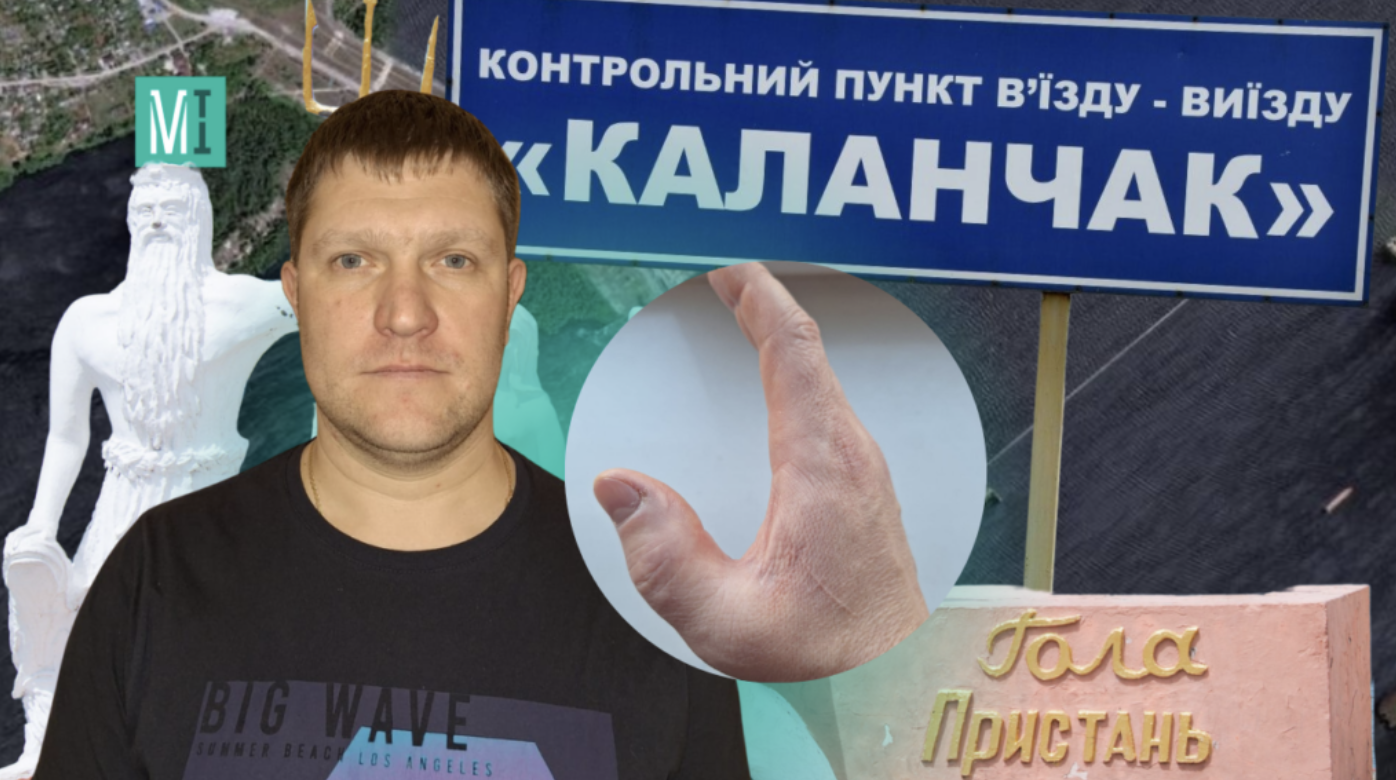A civilian from Golaya Prystan spent seven months in Russian captivity, extinguishing cigarette butts on his body and carving "RF" into his skin.
Resident of Holaya Prystan in the Kherson region, Grigory Golovko, spent seven months and three days in Russian captivity. During this time, he endured inhumane torture: countless beatings, electric shocks, knife cuts, broken limbs, burns from cigarettes, grabbing of genitals, and psychological pressure.
Grigory Golovko shared his story of captivity with the publication MIPCH.
 Collage by MIPCH
Collage by MIPCH When the Russians occupied Holaya Prystan, Grigory Golovko's family was unable to leave the city for various reasons.
On October 13, 2022, the man was taken for questioning at a local police station, where Russians and their accomplices were stationed. He was accused of the deaths of occupiers who were located in the garages of a mineral fertilizer production company called "5 Element." Someone from the locals brought Ukrainian artillery there, and the Russians were destroyed, with Grigory being blamed for it.
In Golovko's phone, they allegedly found correspondence with a friend from the territory controlled by Ukraine, which compromised the man. The information pertained to the village of Bolshaya Lepetukha in the Kahovka district, located 153 kilometers from Kherson, which Grigory had not managed to delete.
Immediately after his detention, the Russians began torturing the man with an electric shock device, applying it to his body. Grigory recalls that it felt like “it lasted an eternity.”
When the FSB agents of Caucasian appearance did not hear what they wanted, they began to threaten to harm the victim's wife and children. In response, the man reiterated that he only reported the movement of Russian equipment on the road. The Russians conducted a search of Golovko's home but found nothing, so they left the family alone.
Golovko was interrogated again by Russian soldiers, who ordered him to squat and then kicked him in the head, knocking him to the ground and continuing to beat him. After lifting him from the floor, they placed a plastic bag over his head, tying it with a rope around his neck, and took him to an unknown location. During the journey, while the interrogation with beatings continued, they twisted his nipples, squeezed his genitals, and threatened to cut them off.
Grigory was taken to a field and made to kneel, simulating a shooting; later, a soldier sat on his back, cut his pants and underwear on his buttocks with a knife, and extinguished cigarette butts on his naked body. After some time, they returned to the station, where the torture continued. Grigory was kicked, hit with the butt of a rifle, and had a finger on his hand broken. Due to the cut underwear, his buttocks were exposed, and a Russian soldier carved the letters RF into his skin to leave a scar.
After these humiliations, the victim was sent to a cell.
The next day, on October 14, Grigory was supposed to be interrogated with a polygraph by FSB officers, but they saw the state of the captive and ordered that he receive medical assistance. A doctor examined the man, prescribed antibiotics, and applied a splint to his broken finger.
Grigory was brought to the village of Kalanchak on October 30, 2022, where the torture continued. A man in a blue police uniform attempted to extinguish a cigarette in his ear, but Grigory dodged, provoking a new beating. He was placed in a narrow cell with inhumane conditions, where everyone was forced to sing the Russian anthem. As the victim recalls, “they treated us like dogs, they did not consider us humans at all.”
In the spring of 2023, prisoners began to be released, and on May 16, Grigory regained his freedom along with horrific memories of Russian captivity.
The Golovko family left the Kherson region in August 2023, traveling through Crimea and Russian territory. They settled in Kharkiv, where they received assistance from volunteers; the man is working with psychologists but says that overcoming the consequences of captivity is challenging.
It is worth noting that Rosgvardiya officer Dmitry Lukogorsky and FSB employee Nikita Dorozhko are being suspected in absentia of violating the laws and customs of war, particularly in the torture of civilian prisoners during the occupation of southern regions of Ukraine.